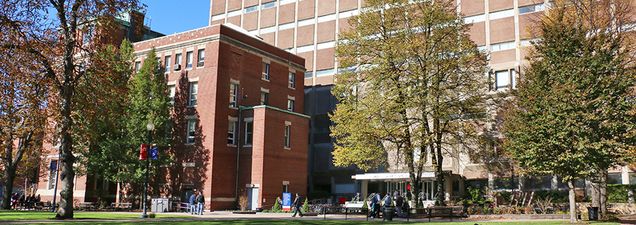Online Graduate Certificate Program

Along with the Master’s program, Clinical Research Online Graduate Certificate students are now eligible for Provost Scholarships.
Clinical research is the fastest-growing discipline in the burgeoning medical device and pharmaceutical industries. Keeping pace with the ever-increasing body of knowledge and new regulatory procedures generated by advances in clinical research is critical to career success. To help researchers keep up to date, Graduate Medical Sciences at Boston University Chobanian & Avedisian School of Medicine offers non-degree graduate certificate program in Clinical Research.
Getting Started: Requirements for this non-Degree Graduate Certificate program include an undergraduate degree from an accredited institution, transcripts and a completed online application.
Important Dates: See more information regarding registration and start dates for distance courses.
Benefits of Learning Online
- Interactivity: Boston University Online programs are filled with activities, animations, and simulations to ensure that students get the most out of their experience. Students participate actively in each course through a variety of means, including online discussions, quizzes, and assignments.
- Flexibility: Versatility is a key feature of Boston University Online courses and programs. Online course materials are available twenty-four hours a day, seven days a week, from any location. Which means that students can learn where and when it works best—for them. Each student determines which hours are best for studying, attending lectures, and completing assignments. Though students must complete course requirements within an established time frame, the actual hours spent meeting those requirements are mostly at the convenience of each individual.
Courses
The certificate program consists of four online courses:
- GMS CI 675 OL Designing Clinical Research Studies – Fall Semester: This course covers important scientific and epidemiologic principles necessary for designing clinical research studies. Topics include bias, confounding, developing the research question, defining an appropriate study population, choosing outcome measures, clinical research ethics and regulation, and statistical analysis issues. [4 cr]
- GMS CI 660 OL Good Clinical Practices – Fall Semester: Introduces regulatory responsibilities of sponsors, monitors, and investigators conducting clinical trials. Practical information and exercises are designed on GCP compliance from an industrial perspective. Topics include: selecting qualified investigators; obtaining ethical approval for patients, and initiating sites successfully. [4cr]
- GMS CI 640 OL Regulatory and Compliance Issues – Spring Semester: Explains the regulatory requirements for healthcare products, that is, drugs, biologics, diagnostics, and devices. Intended for those interested in regulatory affairs or in the clinical evaluation, development, manufacture, testing and/or commercialization of these products. Provides in-depth review of pertinent FDA regulations and guidelines and relationship to scientific and logistical activities involved in taking a product from research to market. Content and preparation of regulatory submissions, including an Investigation New Drug Application (IND), and Investigational Device Exemption (IDE), a New Drug Application (NDA), a Biologic License Application (BLA), a Pre-Market Approval Application (PMA), and a 510K Pre-Market Notification are described. International requirements for health care products are also reviewed. [ 4 cr.]
- GMS CI 789 OL Critical Evaluation of the Medical Literature – Spring Semester: Provides students experience in reading and critically evaluating current research published in the medical literature pertinent to the origination, design, implementation and evaluation of clinical research. **CI 675 OL is a prerequisite for this course. [4cr]
Learning Outcomes
- Demonstrate the ability to design a clinical research protocol.
- Demonstrate the ability to read and critique the clinical research literature.
- Demonstrate the ability to interpret and apply the research regulations, and practices that guide good clinical practice in clinical research.
Program Timeline
Students have the potential to complete the program in one academic year if they opt to take two courses in the Fall, and two courses in the Spring. Students may also opt to take just one course per semester, thus requiring two years for program completion.
Online Certificate Tuition & Fees
Tuition is based on GMS graduate program courses in an online format. Students in the certificate program are eligible receive scholarship funding towards the cost of tuition.
| |
Per credit |
Per 4-credit course |
Total for 16-credit certificate |
| Tuition: |
|
|
|
| Without Scholarship |
$985 |
$3940 |
$15,760 |
| With Provost Scholarship* |
$625 |
$2500 |
$10,000 |
|
|
|
|
| Additional Fees: |
|
|
|
| Technology fee |
$60 |
$240 |
$960 |
| Student Services fee |
|
|
$240** |
|
|
|
|
| Total Cost: |
|
|
|
| Without Scholarship |
|
$4240 |
$16,960 |
| With Provost Scholarship* |
|
$2800 |
$11,200 |
|
| *All applicants to the Clinical Research online certificate program are automatically considered for scholarship funding
** Student services fee is $60/semester. Assumes taking 1 course per semester for 4 semesters. Students may instead take 2 courses per semester for 2 semesters |
Questions?? If you have any questions about the Online Graduate Certificate program, please contact the Program Director, Stacey Hess Pino at sahess@bu.edu.
